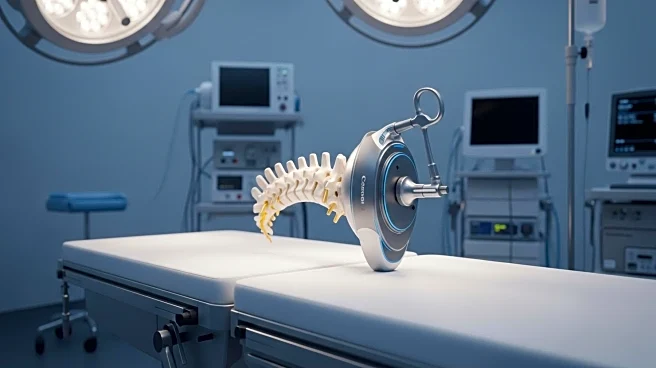What is the story about?
What's Happening?
Surgical Theater has announced that its SyncAR Spine platform has received FDA 510(k) clearance, marking a significant advancement in spine surgery technology. The platform integrates advanced XR tools powered by AI algorithms, allowing patient MRI and CT data to be utilized directly in the operating room. This development aims to enhance preoperative planning and intraoperative execution, providing surgeons with greater clarity and control during spine surgeries. The platform incorporates features such as AI-driven vertebra segmentation, Advanced Decompression Planning, and Segmental Fusion, which align preoperative models with intraoperative CT scans. Dr. Greg Poulter, a spine surgeon at OrthoIndy, highlighted the platform's ability to provide the visibility of open surgery in minimally invasive cases, revolutionizing surgical navigation.
Why It's Important?
The FDA clearance of SyncAR Spine represents a major evolution in surgical visualization technology, potentially transforming spine surgery practices across the U.S. By integrating real-time MRI data into the operating room, the platform offers unprecedented clarity for minimally invasive procedures, which could lead to improved surgical outcomes and reduced recovery times for patients. This advancement underscores Surgical Theater's leadership in surgical XR technology, setting a new standard for intraoperative visualization. The platform's ability to enhance navigation without disrupting existing workflows may encourage widespread adoption among spine surgeons, ultimately benefiting the healthcare industry by improving surgical precision and patient care.
What's Next?
Surgical Theater plans to showcase the updated SyncAR Spine platform at the Congress of Neurological Surgeons Annual Meeting and the North American Spine Society Annual Meeting. These events will provide global spine leaders with the opportunity to experience the platform's capabilities firsthand. As the platform gains traction, it is likely to influence the adoption of XR technology in other surgical fields, potentially leading to further innovations in surgical practices. The continued integration of AI and XR tools in surgery may drive advancements in medical technology, fostering collaboration between tech companies and healthcare providers.
Beyond the Headlines
The introduction of AI-driven tools in spine surgery raises ethical considerations regarding the reliance on technology for critical medical procedures. As AI becomes more integrated into healthcare, questions about data privacy, algorithmic bias, and the role of human oversight in surgical decision-making may arise. Additionally, the platform's ability to transform traditional imaging into dynamic surgical roadmaps could lead to long-term shifts in surgical training and education, emphasizing the importance of technological proficiency for future surgeons.















